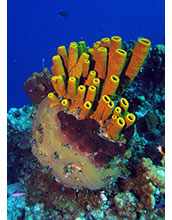Multimedia Gallery
Loss of predator fish affects sponge communities in Caribbean (Image 5)
More than five different species of sponges cover a coral head on a reef in the Bahamas. Research suggests that a decrease of predator fish, which feed on sponges, due to overfishing greatly impacts coral reefs in the Caribbean.
More about this image
Research by Joseph Pawlik and Tse-Lynn Loh, ecologists at the University of North Carolina Wilmington, suggests that the loss of predator fish like angelfish and parrotfish from overfishing can alter sponge communities across the Caribbean. These predator fish are important because they feed on sponges that grow on and sometimes smother coral reefs, thereby keeping sponge growth down.
For the study, which was funded by the National Science Foundation (NSF), the biologists examined 109 species of sponges at 69 Caribbean sites, with the 10 most common species making up 51 percent of the sponge cover on the reefs.
The researchers found that reefs in the Cayman Islands and Bonaire that are designated off-limits to fishing have higher numbers of fish. These reefs have mostly slow-growing sponges that produce chemicals that taste bad to predatory fish. The predatory fish feed on fast-growing, "chemically undefended" sponges, leaving the bad-tasting but slow-growing sponges.
On the other hand, overfished reefs like those off Jamaica and Martinique are dominated by fast-growing, better-tasting sponges because there are too few fish around to eat them, so the sponges quickly take over the reefs.
"It's been a challenge for marine ecologists to show how chemical defenses influence the structure of ocean communities," says David Garrison, a program director in NSF's Division of Ocean Sciences, which funded the research. "With this clever study, Pawlik and Loh demonstrate that having--or not having--chemical defenses structures sponge communities on Caribbean coral reefs."
Loh and Pawlik say that overfishing of Caribbean coral reefs, particularly by fish trapping, removes sponge predators and is likely to result in greater competition for space between faster-growing, palatable sponges and endangered reef-building corals. Pawlik believes results from this research support the need for marine protected areas to aid in coral reef recovery. [Research supported by NSF grant OCE 10-29515.] (Date of Image: 2011-2013) [Image 5 of 6 related images. See Image 6.]
Credit: Joe Pawlik, University of North Carolina Wilmington
Images and other media in the National Science Foundation Multimedia Gallery are available for use in print and electronic material by NSF employees, members of the media, university staff, teachers and the general public. All media in the gallery are intended for personal, educational and nonprofit/non-commercial use only.
Images credited to the National Science Foundation, a federal agency, are in the public domain. The images were created by employees of the United States Government as part of their official duties or prepared by contractors as "works for hire" for NSF. You may freely use NSF-credited images and, at your discretion, credit NSF with a "Courtesy: National Science Foundation" notation.
Additional information about general usage can be found in Conditions.
Also Available:
Download the high-resolution JPG version of the image. (5.3 MB)
Use your mouse to right-click (Mac users may need to Ctrl-click) the link above and choose the option that will save the file or target to your computer.



